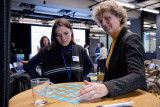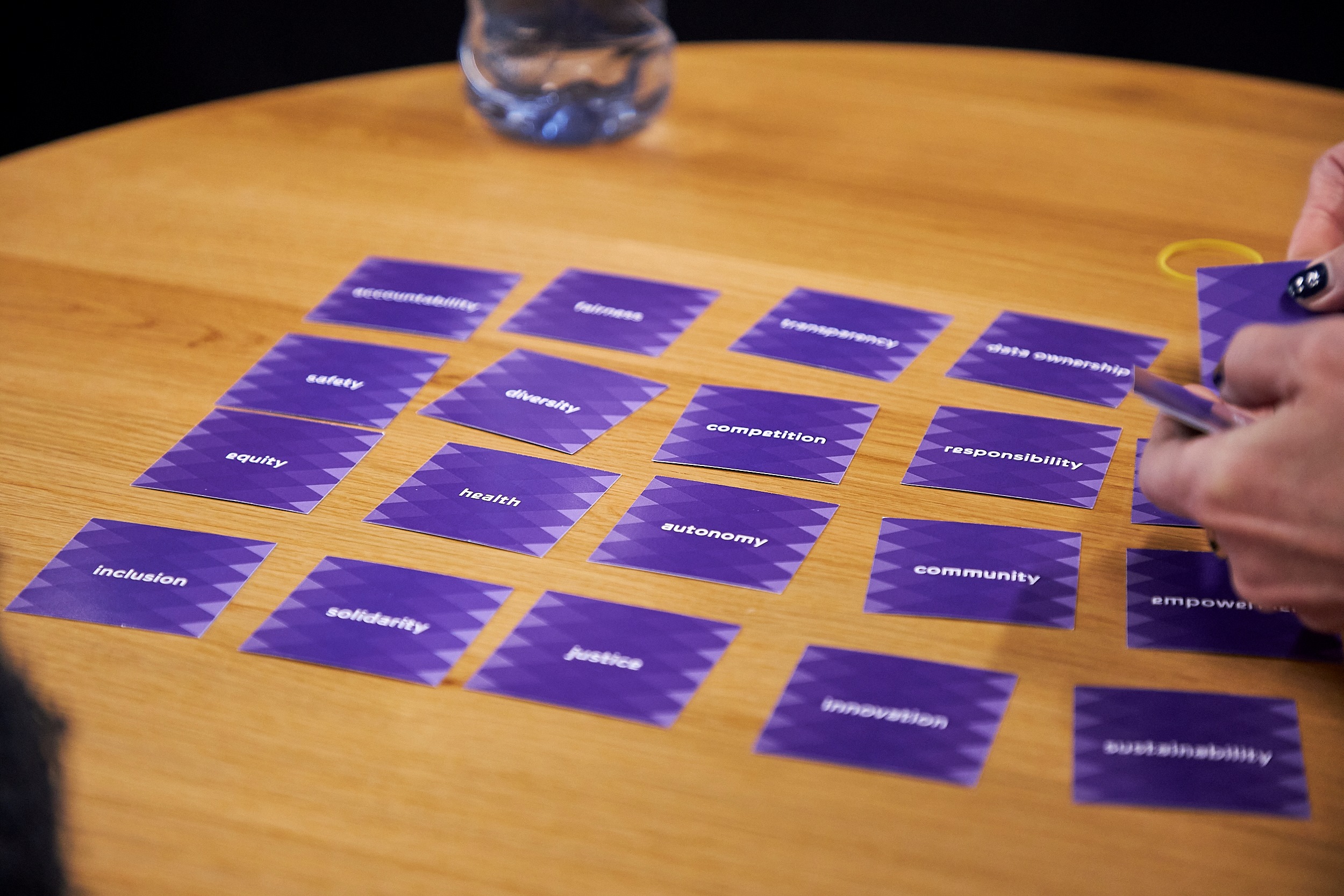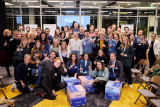How can digital techniques help us to get our societies back on track safely? What can we learn from other countries already using digital tools during Covid 19? With a special focus on the contract-tracing apps. This was the topic of the first online edition of “Worldwide Data Dilemmas”, hosted by Amsterdam Smart City and DataLab Amsterdam on April 23.
According to experts, in addition to large-scale testing, contact tracing will be a key tool for reopening our economies and preventing a second wave of infection. Typically, public-health workers map out where a person who tests positive for Covid-19 has been during the time they could have been contagious. Possible contacts are then notified so those people can be tested for the virus and/or self-quarantine. Contact-tracing apps promise to speed up and improve this process. Digital surveillance tools, including contact-tracing apps, were first launched in China and are now being considered all over the world. In the Netherlands, the Ministry of Health announced that it was considering using two apps: one for monitoring symptoms and one for contact-tracing. The announcement lead to broad public debate about how such apps should be designed and implemented.
How can digital techniques help us to get our societies back on track safely? What can we learn from other countries already using digital tools during Covid 19? With a special focus on the contract-tracing apps. This was the topic of the first online edition of “Worldwide Data Dilemmas”, hosted by Amsterdam Smart City and DataLab Amsterdam on April 23.
Leonie van den Beuken, Amsterdam Smart City program director, welcomed the participants and opened the online get together: “A world in transition requires an independent place where change makers can meet, interact and collaborate. Amsterdam Smart City is that independent place. We are an open innovation platform that brings together proactive citizens, innovative companies, knowledge institutions and public authorities to shape the city of the future. Now during the Covid-19 crisis, we encounter an unique situation where cities all around the world simultaneously experience the same challenges. Now, even more than ever, knowledge and experience exchange is key. That’s why we will take the coming hour to explore different perspectives from South Korea, Sweden, USA, and Canada, followed by a discussion about the situation in the Netherlands.”
South Korea: Self-quarantine Safety Protection App
Mirian Song of Winitech introduced the “Self-quarantine Safety Protection App” developed for the South Korean Ministry of Health and Welfare. The app is used by people who test positive for Covid-19 and those returning to the country. They are required to install the app and undergo a fourteen day quarantine. Those who leave the quarantine area without permission face fines and imprisonment (or deportation in the case of foreigners). GPS is used to keep track of users’ locations and the data is stored in on a centralized government server. While the app is not used for contact tracing per se, the Korean government leverages a number of other technologies and personal data, including citizens’ credit card records, cellphone GPS data and the wide-ranging network of security cameras to track and trace contacts of infected patients. In combination with aggressive testing, these digital solutions have helped South Korea get the pandemic under control and prevented a lock-down. While Korean people generally trust their government, some experts warn that Korean-style surveillance methods come at a potential cost in civil liberties.
Sweden: Avoiding a Cure that is Worse than the Disease
The situation in Sweden stands out in Europe, for not having imposed a lock-down. John Dekker of the Netherlands Innovation Network (Embassy of the Kingdom of the Netherlands in Stockholm) introduced the situation. There is no lock-down because of concerns that this cure could have greater economic and social consequences than the disease itself. Still, most shops are closed and the streets are quiet, because Swedish people take recommendations from the government seriously and want to act responsibly. John explained: ‘People place a lot of trust in experts and policies are driven by independent health agencies. If they say, you should use an app, people will do it.’
Technology-wise, Swedish authorities have used aggregated and anonymized telecom data to monitor areas of activity. In the short term, the government is developing a health monitoring app, which will store data locally on the phone. A “proximity” or contact-tracing app is being discussed, but such a solution requires substantial consultation with experts and the public.
United Sates: A Fragmented Approach
While people in South Korea and Sweden place a lot of trust in experts and the government, this is not the case in the United States of America, as explained by Nigel Jacob, Chief Innovation Officer of the City of Boston. Trust in government – especially federal government – is low and the response to the crisis is led primarily by local and state authorities. At the local level, the City of Boston is focused on protecting the most vulnerable, for example by distributing meals to homeless people and educating the public how tracking can be of help. And the State of Massachusetts is building a manual contact-tracing plan using volunteers who will call the contacts of people testing positive for Covid-19.
On a technology front, Nigel explained there are three large efforts for contact tracing. Safe-Paths, lead by MIT and Covid Watch, lead by Stanford are based on Singapore’s TraceTogether app and are Bluetooth-enabled. Both initiatives are working closely together and are based on decentralized architecture, storing data locally and anonymously. The third effort is the Google-Apple collaboration to create a cross-platform contact-tracing API. So far, this process is not transparent.
Canada: Balancing Individual Privacy and Public Health
Dan Glikstein, a researcher from Montreal, introduced the situation in Canada where contact-tracing falls under provincial authority while quarantines are the responsibility of the federal government. Both federal and provincial representatives view contact-tracing as key to re-opening the economy and they see a role for technology in halting the pandemic. So far, the Ministry of Health has worked with Thrive Health, a private company to deploy a symptoms tracking app that does not perform contact-tracing. A similar app is used by the government of British Columbia. The data collected in both apps are encrypted and stored in Canada. Other provinces, as well as the City of Ottawa are developing or testing contact tracing apps while making assurances that the data will not be sold or used for purposes other than healthcare. In response to these developments and pressure from privacy groups, the Privacy Commissioner of Canada published a guide for Assessing Privacy-Impactful Initiatives in Response to COVID-19. The guide lays out nine principles to help balance individual privacy and public health when assessing possible solutions in response to the crisis.
The Dutch Experience: Open Process Leads to Valuable Insights
Following these international perspectives, we turned our attention to the Netherlands. Tom Demeyer, Waag’s Chief Technology Officer, introduced the chronology of events since April 7 when the Health Ministry first announced it was considering the use of two apps, one for health monitoring and one for contact-tracing. Shortly after, Waag, Bits of Freedom and other concerned parties initiated the Safe Against Corona Manifesto consisting of ten criteria for privacy-preserving contact-tracing. In doing so, the consortium wanted to combat the so-called false choice between privacy and health. A few days later, the Ministry announced an open call for companies and organizations to provide "smart digital solutions" to support health authorities in their contact tracing efforts. More than 700 submission were received and eight solutions were invited to participate in an “Appathon” over the weekend of April 18-19. The Appathon allowed experts and the public to scrutinize the seven participating solutions. One of the key outcomes of the Appathon was the realization of the high risk of overloading health care workers due to false positives – a main disadvantage of Bluetooth-based solutions. And, while none of the seven solutions met all privacy and security requirements, the Appathon helped stakeholders better understand the key criteria for contact-tracing apps. Ultimately, there was broad support for the open and constructive approach and calls to apply similar consultation processes for future public ICT projects.
What have we learned?
After a brief Q&A with the participants, Leonie asked the speakers to reflect on the role of digital technologies in responding to the crisis. What have we learned so far from the experience with contact-tracing apps that we should leverage when considering other technological solutions? Tom urged the audience to not automatically jump to technological fixes, overlooking potential analog solutions (ie.low-tech facemasks might do more to help us reclaim our streets than high tech crowd-monitoring solutions). Nigel echoed the importance to consider analog solutions and wished for more training and dialogue so that civil servants and the general public could better understand the risks and benefits of new digital technologies. John and Dan emphasized the need for transparent processes in debating and evaluating solutions in liberal, democratic societies. Mirian emphasized that by using big data the Korean government managed to reduce the time spent on contact tracing from one day to ten minutes on a case-by-case basis, and stressed the need to safeguard personal data with a trusted government authority rather than private companies.
Follow-up event
What do you think? How can governments use responsible digital tools alongside analog solutions to transition to the 1.5 meter society? We are looking for ideas to explore in a follow-up event. Share your comments below or send an email to <cornelia@amsterdamsmartcity.com>.
Livestream recording
We apologize for technical issue which resulted in the first 15min of the session not being recorded. You can look back on most of the session via the livestream recording:
[►
Livestream | Worldwide Data Dilemmas: contact-tracing apps during corona times
note: the first 10 minutes of the online webinar are missing. So, the opening of Leonie van den Beuken (Amsterdam Smart City) and the perspective of Mirian Song (South Korea, Winitech). Worldwide we are seeing digital technologies implemented in response to the corona crisis. Contact-tracing apps
amsterdamsmartcity YouTube](https://www.youtube.com/watch?v=7TONzXLLeOw&feature=youtu.be%20)






